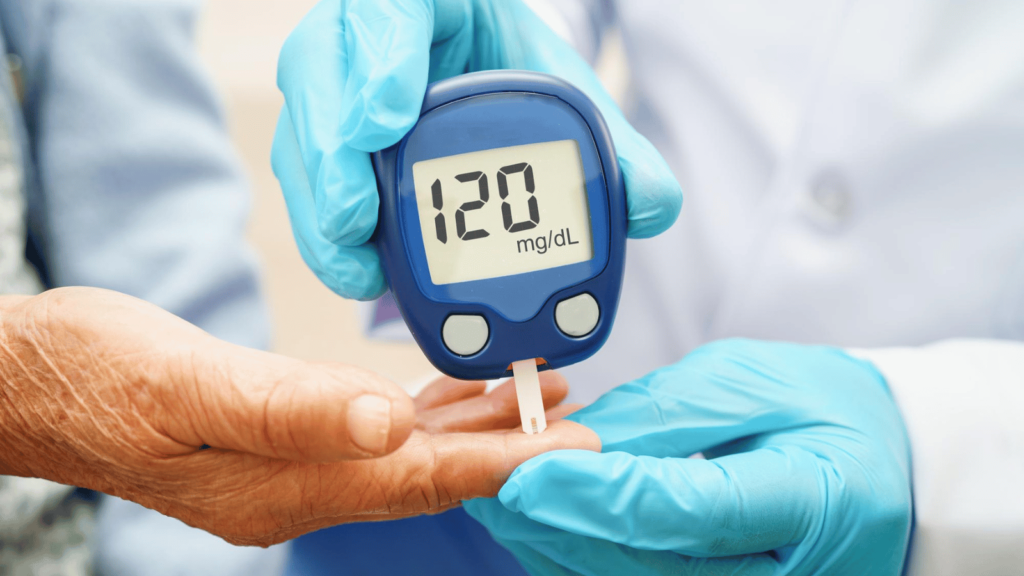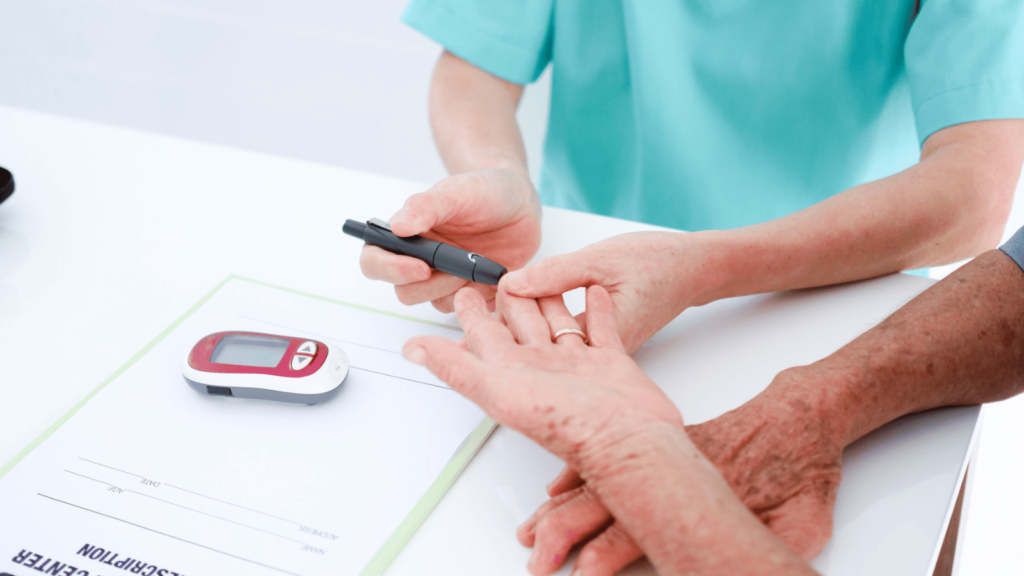A diabetes doctor is crucial for the right control of diabetes and to save you headaches. No matter if you have been newly diagnosed or living with diabetes for years, the right endocrinology diabetologist helps tremendously in maintaining good health over the long run.
A diabetes care specialist can provide you with treatment plans tailored to your specific needs and help you monitor the status of your condition.
Read on to see why selecting a diabetes doctor is critical, how you can choose the right specialist and what are your options at the typical diabetes doctor visits for better care.

Credit: https://www.freepik.com
Why You Need a Diabetes Doctor
Diabetes is a complicated illness that requires more than measuring your blood sugar to monitor.
A diabetes doctor is a key person in helping you to understand the details of your condition and restore disease care according to your necessities. The reason working with a diabetes specialist doctor is so important:
Expertise in Diabetes Care
A diabetes specialist knows better about sugar control and outcomes with less chance of complications. Family doctors and internists provide diabetes care at the most basic level, but an endocrinologist for diabetes is a specialist with advanced training in this field.
Endocrinologists are specialists in managing hormonal imbalances, insulin therapy, and other treatments that may correspond to diabetes. You receive the latest, correct care by being with an expert.
Personalized Care Plans
The reality is that every individual living with diabetes has other requirements depending on some health background, lifestyle, or possibly a mix of factors.
Your diabetes care specialist would be able to personalize your treatment plan according to these individual factors.
From tweaking medication, prescribing lifestyle changes, or tracking chronic blood sugar patterns over the long term a diabetes doctor is there to make sure your care plan grows with you.
You’ll get tailored advice on diet, exercise, and how to better manage your medication so that you can always be on the best path to improved health.
Regular Monitoring and Adjustments
The first reason you should locate a diabetes doctor is the ongoing monitoring they offer. Medications such as insulin or oral drugs need constant modification, so diabetes treatment is always evolving.
At your diabetes doctor appointments, they will evaluate how well you are doing with your management and help to change things if needed.
Follow-ups let you know if your diabetes is still under control — monitoring to ensure that it’s not leading to or flaring up more severe problems like neuropathy, retinopathy, and heart disease.
Preventing Complications
Poorly managed diabetes can cause serious long-term complications such as nerve damage, kidney problems, and vision issues. Working with a diabetes specialist doctor will decrease your chances of having health risks.
They can also work with other specialists (a cardiologist or ophthalmologist, for instance), so you get the full spectrum of care.
A diabetes doctor is a critical part of your care team to help you navigate and manage your condition for the rest of your life.
They are the experts in their fields and have a helping hand in keeping you safe from complications while managing your diabetes to make it easier for you.

Credit: https://www.freepik.com
What to Expect from a Diabetes Doctor
Working with a diabetes doctor is not only for managing blood sugar but you are getting along life partner who helps to understand the seriousness of food and many more around this disease.
Your diabetes doctor can provide the knowledge, direction, and individualized attention that may enhance your quality of life for the better.
Whether you have been diagnosed recently or are looking for more specialized care, here is what to expect from a diabetes doctor.
Initial Diagnosis and Assessment
If you go to a diabetes doctor for the first time, an extensive assessment of your situation often begins. This includes taking a medical history, and family history, detailing your current symptoms and habits.
To help them see how well your body is managing blood sugar from all the different foods you are eating, most likely a series of tests including HbA1c (overall 3-month control), fasting glucose, and maybe cholesterol or kidney function done after at least twelve weeks on an ultra low-carbohydrate diet.
In doing so, you will enable your doctor to compare all the good with any bad results indicated on these tests and get a clearer idea of what is normal for you, which can inform an individualized treatment plan.
When you visit a specialist for diabetes, such as an endocrinologist who deals with diabetic patients, they are also likely to evaluate whether there are additional risks due to long-term complications from the disease (neuropathy and retinopathy) or even looking at your cardiovascular health.
This in-depth assessment will begin to provide you with the tools needed to open your perspective and focus on what works best for you. It marks the beginning of actively managing yourself through living alongside diabetes.
Creating a Treatment Plan
Based on your first check-up, the diabetes doctor will prepare a specially designed treatment plan that fits in with your day-to-day routine and other medical requirements.
This plan will focus on medications, diet, exercise and blood sugar monitoring. If you have type 2 diabetes and need insulin, your doctor will teach you the steps to take for selecting an appropriate medication dosage as well as how to inject it accurately.
Together with the above advice, you will also receive lifestyle guidance from your diabetes doctor such as- diet and exercises that are important to maintain blood sugar levels correctly.
The treatment plan is subject to change based on how you feel over time. Weekly diabetes doctor appointments will be scheduled to check in on your progress, adjust treatment if necessary and discuss any new symptoms or problems.
Continuous Support and Education
One of the most priceless benefits of having a diabetes doctor on your side is that they offer continued support along with invaluable knowledge.
Managing diabetes demands more than just eating healthily, that is why you should know how the influence of this condition works on your body and what steps to prevent it.
Your diabetes doctor will instruct you on how to check your blood sugar at home, detect when it’s too high or low, and alert you of times that would warrant emergency care.
Just a few visits in, education persists. You will be provided with constant guidance about your diet, participation in physical activities, and stress management affecting your blood sugar levels.
Health is power, and the more you know about health (your own and in general), the stronger you can be to become your best doctor. Your diabetes doctor can give you the tools and knowledge to manage it yourself.
Managing Medications and Insulin Therapy
Taking medication or insulin therapy: Managing this part of diabetes care may seem overwhelming.
Your diabetic doctor is an important piece when it comes to managing medications, as they will be the ones ensuring your medication therapy is being tailored specifically for you.
Make sure to track how well you do on medications and your dose of metformin or insulin compared to blood sugar numbers, lifestyle, and condition changes.
Your diabetes doctor will warn you if your prescription is insulin and how to correctly inject, store it as well times for the dosing corrections.
They also allow you to see exactly how your food intake, physical activity, and stress levels correspond with just where that sweet spot is in terms of insulin requirements for each.
However, with appropriate direction and monitoring by your diabetes doctor, insulin therapy becomes easy to manage while helping you effectively control your diet.
Coordinating with Other Specialists
Diabetes is a complex disease that usually entails seeing several different types of healthcare providers.
Your diabetes doctor may also refer you to other specialists including dietitians, cardiologists, podiatrists, and ophthalmologists for complete health coverage.
For example, if you have heart disease or concerns about your kidneys then it is necessary that both you and your diabetes doctor work with a cardiologist (heart specialist) or nephrologist (kidney specialist to manage these situations aggressively.
With a diabetes care specialist who works with other experts, you get the full picture of health and not just blood sugar management.
This team takes care of all aspects of your health so that long-term complications are avoided and you remain the best possible healthy.
When you have a diabetes doctor at your side, you get the expertise needed to reach and maintain tight control of your blood sugar levels in order to prevent complications.
Your diabetes doctor offers advice, from personalized treatment plans to continual support, that you need to live a healthier lifestyle.

Credit: https://www.freepik.com
How to Find the Right Diabetes Doctor
Selecting the perfect diabetes doctor is a vital step in controlling your blood sugar. Having a great doctor to get professional advice on how exactly to help control your blood sugar, without getting complications.
If you are looking for one then find the best diabetes specialist that fits your needs, here how to do this:
Endocrinologist vs. General Practitioner
It is important to differentiate between a general practitioner and a specialist doctor for diabetes while selecting your diabetes doctor.
Although a general practitioner may deliver adequate care for diabetes, an endocrinologist specializing in the disease is frequently recommended due to his depth of knowledge.
Endocrinologists — specialists in hormonal conditions, such as diabetes can provide guidance on insulin therapy, medication management and help prevent complications.
However, if your diabetes is well-controlled and you have a fairly simple situation going on then regular check-ups with a general doctor could be all that’s needed.
In these cases seeing an endocrinologist for diabetes management may be preferable, as this will ensure that any serious complexities associated with the complex or the complications are effectively managed and treated.
More severe cases may require specialized care from an endocrinologist with more involved management and individualized solutions..
Consider Credentials and Experience
Experience and credentials: Select a diabetes doctor based on their experience level and qualification. Seek out endocrinologists and other diabetes specialists who are board-certified in their specialty.
That way, they can be sure their diabetes care will be tackled by experienced professionals.
After all, someone who is more experienced in caring for diabetes has probably already come across several cases and knows precisely what type your case will be.
Check the diabetes center: It is strongly suggested looking to see whether these specialists have any affiliations with well-known medicinal companies.
Ask them how they manage diabetes (such as their focus on patient education), how often they see patients, and if it is possible to keep up-to-date with the latest treatments/technologies relevant to your condition.
Reading Patient Reviews
You can gain some insight into how a diabetes doctor approaches being in practice and if their patients are happy through patient reviews.
Read through the reviews and see what they say about the doctor’s bedside manner, accessibility, how well he or she manages diabetes.
Do they answer patient questions? Do they clarify things well? Are they working in conjunction with the patient?
If the diabetes doctor is willing to address these areas and you get positive feedback on those particular aspects then it’s a good indicator that your primary care physician cares about how things are going with his/her patients.
When you read reviews, look at how the doctor’s office is run. A look at reviews may tell you the waiting times, how easily they will schedule diabetes doctor appointments and generally how well complaints are handled by staff.
A diabetes doctor will make it feasible for you — and give you great long-term care provided they are capable at communicating with their patients, have an effective clinic and generally positive encounters.
Location and Accessibility
Practical things — like location and convenience to you are also important when selecting a diabetes doctor. Since diabetes treatment requires regular monitoring and checkups, you want your doctor to be somewhere nearby.
Few people enjoy a long drive or other challenging transportation just to honor their appointments.
Think about whether the hours of availability at the diabetes doctor’s office align with your work or personal commitments. Since type 1 diabetes requires constant care, a lot more access to your specialist is foreseeable.
Ask for Recommendations
Recommendations are one of the best ways to find a diabetes doctor that you can trust. If someone you know has diabetes, your general practicing physician may be able to refer to a good specialist who works with diabetics.
You can also ask diabetes support groups or organizations in your area for recommendations. You can also search for providers associated with popular hospitals or diabetes care centers via online directories.
A lot of hospital websites make it easy for you to filter doctors based on their specialization, location and patient ratings which can help in the search process when looking for a diabetes doctor.
Trust Your Gut
Once you visit a few candidates for your diabetes doctor, it really is vitally important to trust how you feel. You will be working together with your doctor very closely so this relationship is key to determining the practitioners’ appropriateness for you.
If you trust a doctor and feel comfortable with his or her approach, that is likely the right physician for you.
However, if it does not feel right or you do not find yourself being heard/understood, seek another diabetes doctor that better suits your needs.
Following these steps will help you establish a good relationship with your diabetes doctor and receive competent treatment to manage diabetes better.
With the proper specialist there to help you address it, however, treating your condition and avoiding unnecessary medical complications is generally easier.

Credit: https://www.freepik.com
Benefits of Working with a Diabetes Doctor
Working with a diabetes specialist doctor can be hugely beneficial when you do not want to get stuck in managing your condition and being troubled by liberal complications associated with it.
As a complex disease, diabetes requires personalized treatment due to the simple fact that there is simply no “one size fits all” approach. The following are some of the main pros for using a diabetes doctor:
Early Detection of Complications
One major advantage of having a diabetes doctor is that they can recognize complications early.
Neuropathy, retinopathy and cardiovascular disease are only a few examples of the major complications that diabetes can cause — often with no signs or symptoms until it is in advanced stages.
A diabetes specialist doctor knows the subtle signs of a problem before it becomes full-blown and can typically forestall worse from happening in real time.
Seeing your diabetes doctor regularly allows him or her to keep close tabs on how you are doing, which can detect potential complications before they develop.
Better Blood Sugar Control
The mainstay of diabetes care is controlling blood sugar, and an endocrinologist can help you achieve excellent control.
A diabetes care specialist will help you make changes to medication, start on insulin therapy or adjust your lifestyle as necessary so that your blood sugar stays in target ranges.
They are able to personalize your diabetes treatment plan and adjust as necessary in order for you to avoid the highs or lows.
Last but not least, a diabetes doctor also teaches you about how factors like diet, exercise stress; illnesses, etc. impact your blood sugar levels.
Thanks to their invaluable assistance, you will learn many aspects of how to manage your diabetes on a daily basis.
Emotional and Psychological Support
It can be tough to live with diabetes emotionally and psychologically. It can feel a little overwhelming, constantly checking blood sugar and taking meds or making lifestyle changes…
A diabetes specialist doctor helps in medical care and emotionally, they support you. They can provide guidance on emotional aspects, too: after all they know firsthand how hard it is to live with diabetes.
Sometimes your diabetes care specialist might refer you to a counselor or support group (to help with the mental health issues of living with diabetes).
This approach enables you to get full care for all aspects of your life both physically and emotionally.
Preventing Long-Term Complications
The goal of managing your diabetes is to avoid long-term complications, and the diabetes specialist doctor can help with this.
A diabetes care specialist keeps an eye on your blood sugar (glucose) levels, makes changes in the treatment plan when required, and offers preventive care to decrease the chances of complications like kidney disease, heart problems, etc.
In addition, your diabetes specialist doctor will coordinate care with a variety of specialists (ie., cardiologists, nephrologists, ophthalmologists) to make sure that all areas of health are addressed.
Personalized Lifestyle Coaching from your diabetes doctor
Perhaps the most significant benefit of visiting with a diabetes specialist doctor is that they give personalized advice on which foods to eat and avoid, exercise programs tailored specifically for each person’s health needs/preferences, or lifestyle modifications unique to themselves.
You and your doctor can determine the plan that best meets your preferences, so you do not feel overwhelmed.
You will learn to make gradual and achievable changes in your life with the help of a diabetes care specialist — for example, how to eat whole foods more often, be physically active more consistently throughout the week, or experience less stress.
Those are necessary changes to live healthfully and regulate blood sugar levels.
Access to the Latest Treatments and Technology
Your diabetes care specialist will also update you on the latest treatment options, technology, and approaches to care.
A diabetes specialist is always current with breakthroughs in this area, and he can direct you to the newest efficacies that might come across your requirements.
From continuous glucose monitoring (CGM) devices to insulin pumps to new medications, your diabetes specialist doctor can help you check out tools that could make living with the disease a little easier for you.
Being able to use such innovative technologies, can possibly help you manage your diabetes in a comfortable way and increase accuracy while monitoring yourself.
Follow up with your diabetes specialist doctor, and track that you are using the latest tools provided to keep things in check.
Tips for Managing Diabetes with Your Doctor
Diabetes care is a partnership between you and your diabetes care specialist. By playing an active role in your care and communicating with your team of diabetes professionals, you can find out what will work best for you.
Taking these steps for successful diabetes management will help you to get the most out of working with your diabetes specialist :
Keep a Log of Your Symptoms and Blood Sugar Levels
Recording your blood sugar and symptoms every day (what you eat, when you take insulin or other meds) is possibly one of the most important tools in diabetes management.
Your diabetes specialist will then be able to view these results in sequence and has the most possible information with which to treat you accordingly.
Record check your levels: you should regularly record — and therefore monitor— your blood glucose measurements in a log or through an app; using either BP test strips together with a CGM device.
It also lets you follow how food, exercise, and stress all play a role in the rise of your blood sugar.
When you show this information to your diabetes specialist during your appointments they are able to provide the necessary changes in medication or insulin therapy and as a result better blood sugar control.
Ask Questions and Stay Informed from your diabetes doctor
Your diabetes healthcare provider can also help you to know your disease better. Ask questions at your appointments about medication, lifestyle changes, or potential complications.
Also, it allows you to own your diabetes and make better decisions for yourself. To make sure you address all the concerns, prepare a list of questions before each diabetes doctor appointment.
For example, how to control blood sugar spikes, the relationship between your diet and diabetes, or what you should do if you feel high or low sugar.
Reading up on your condition keeps you empowered to take an active part in living with it.
Stay Consistent with Appointments
Get regular check-ups with your diabetes doctor. Regular check-up is a much-needed session for effective management of diabetics.
Missed visits can cause gaps in care and may make it difficult to manage your diabetes.
Plan to visit your diabetes specialist doctor at least every 3–6 months (or more frequently, if you are not in good control).
Your diabetes care specialist will probably have tests, including HbA1c to measure your long-term blood sugar control and may adjust your medication or insulin as necessary during the visits.
Keeping up with these check-ups will eventually mean always being dialed in.
Follow Your Diabetes Doctor’s Advice
It is your diabetes doctor who creates a custom treatment program to control yourself; all you have to do is follow what they tell you.
From taking medication as recommended to eating a healthful diet and engaging in regular exercise, diabetes management requires consistency.
If you are having trouble following the plan — whether it is diet changes or stress management, for example–speak to someone who cares for your diabetes.
They can work with you to reach a solution or modify the plan so it fits your life better. This also reminds me that if you communicate with your doctor, many treatments can be acceptable just as long they are not inappropriate.
Be Honest About Your Habits and Challenges
The best docs need good data to care for your illness. Be honest about your lifestyle, diet, and how or the extent to which you are following your treatment.
Oftentimes, if you are dealing with certain issues in the management of your diabetes (like just plain forgetting to check blood sugar or having some trouble taking medication as prescribed), share that information with your physician.
Being honest allows your diabetes specialist doctor to intervene with helpful solutions or changes in treatment, which will only benefit you. It helps the patient and provider create trust, leading to better diabetes control.
Stay Open to Adjustments and New Treatments
Diabetes is not static; what may work for you may no longer be a helpful tool.
As the condition advances, your diabetes doctor can change treatment strategies — from adjusting medications to a different regimen of insulin or even adopting new technologies like continuous glucose monitors.
Another important thing is to be flexible on these changes and trust the diabetes care specialist regarding your treatment.
They are working to make the best choice possible with your long-term diabetes management in mind.
Also, remaining updated on the latest treatments and technologies enables you to investigate potential advancements that could better your quality of life.

Credit: https://www.freepik.com
Conclusion
A diabetic patient needs to work closely with a diabetes specialist if he or she wishes to control the condition over time and survive in good health.
Through personalized treatment plans, expert advice and constant support for early identification of complications a diabetes care specialist provides invaluable assistance on your path with diabetes.
Close monitoring, proactive care, and following through with frequent diabetes doctor visits over the years will help to make a difference in managing your blood sugar better for a healthier life overall.
FAQs
1. Do I need a diabetes specialist or can a general doctor manage my diabetes?
Although a primary-care doctor can handle your diabetes in the beginning, they may refer you to an endocrinologist or other physician who specializes in treating this disease.
If your diabetes is complicated, you have other medical issues related to your blood glucose or you’re having serious complications from the disease, seek out an endocrinologist for diabetes.
2. How often should I see my diabetes doctor?
You need to revisit your diabetes doctor once every 3–6 months. But if your blood sugar is out of control or you have complications, then it could be a good idea to come in more often.
3. What should I bring to my diabetes doctor appointment?
Make sure you take your blood sugar stats from this sheet, any drugs you’re currently taking & all the notes of symptoms/challenges you have. This will allow your diabetic doctor to make the proper adjustments regarding your therapy as appropriate.
4. How can I find a good diabetes doctor near me?
You may consult your primary care physician for a referral, browse online to find endocrinologists in your area, or contact local diabetes support groups.
You can also read patient reviews to make up your mind about the doctor that is right for you.
5. Can a diabetes doctor help with weight management?
A diabetes care specialist, on the other hand, can assist you with dieting and exercise recommendations as well as lifestyle changes that may help out in some way for weight management.
This must be your priority with maintaining good blood sugar levels and ultimately having a positive impact on his diabetes.
